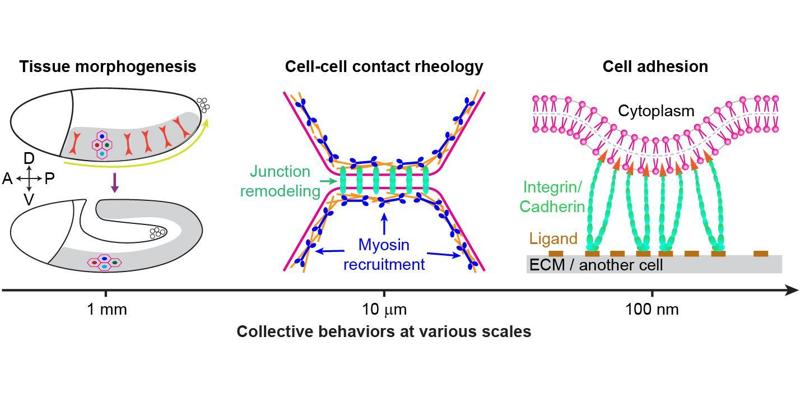- Imprimer
- Partager
- Partager sur Facebook
- Partager sur X
- Partager sur LinkedIn
Séminaire
Le 22 décembre 2023

Shao-Zhen Lin (Centre de Physique Théorique, Turing Center for Living Systems, Marseille)
My research focuses on collective behaviors in biological systems across scales, ranging
from tissue morphogenesis (at ~ 1 mm scale), to cell-cell contact rheology (at ~ 10 µm), to
membrane adhesion (at ~ 100 nm scale). This is critical to understand various physiological
or pathological processes including embryo development, cancer invasion, and immune
response. These processes take place mostly through collective cell motions, and involve
cytoskeleton dynamics and biochemical signaling at the subcellular scale, and interactions
among cells at the multicellular scale. I aim to study these collective behaviors from a
multiscale view using physical approaches. In particular, at the tissue level, I investigated
collective cell migration; at the cellular level, I studied active rheology of cell-cell junctions;
at the subcellular level, I explored cluster formation of cell adhesion proteins.
In the first part of my talk, I will first present an experimental study on the velocity and
energy statistics of tissue flows in various cell monolayer systems. I then show how to
model tissue flows using both a cell-based computational model and a continuum model
(active gel theory), where the roles of cell activity, apical-basal asymmetry, cell-cell
interactions, boundary constraints, and substrate curvature are explored. I further show how
to apply the established model to investigate tissue morphogenesis, taking the spontaneous
fracture of epithelial tissues as an example.
In the second part of my talk, I will talk about the clustering of cell adhesion proteins (e.g.,
integrins, cadherins) during cell adhesion to a substrate or another cell. I propose two
complementary mechanisms: (1) tilt mechanism, i.e., the intrinsic tilt of adhesion proteins
with respect to the membrane; (2) curvature-sensing mechanism, i.e., adhesion-dependent
spontaneous curvature. I will demonstrate how these two mechanisms lead to stable cluster
formation and the distinction between them. I further show experimental validation of my
theoretical predictions in integrins.
Contact: Jocelyn Étienne
Date
11:30
Localisation
LIPhy, salle de conférence
- Imprimer
- Partager
- Partager sur Facebook
- Partager sur X
- Partager sur LinkedIn